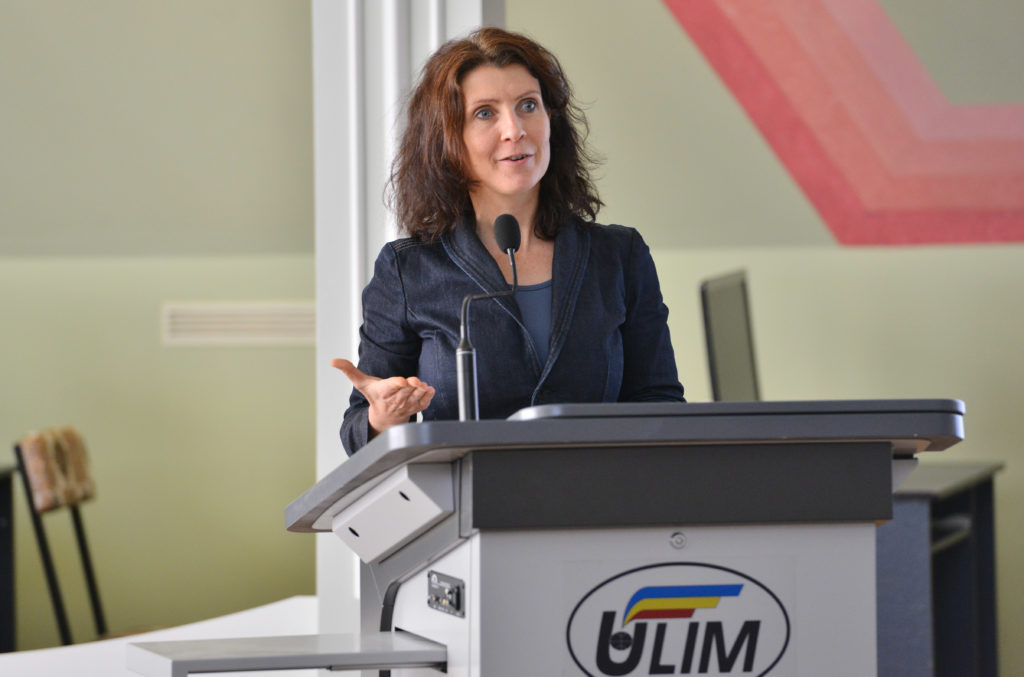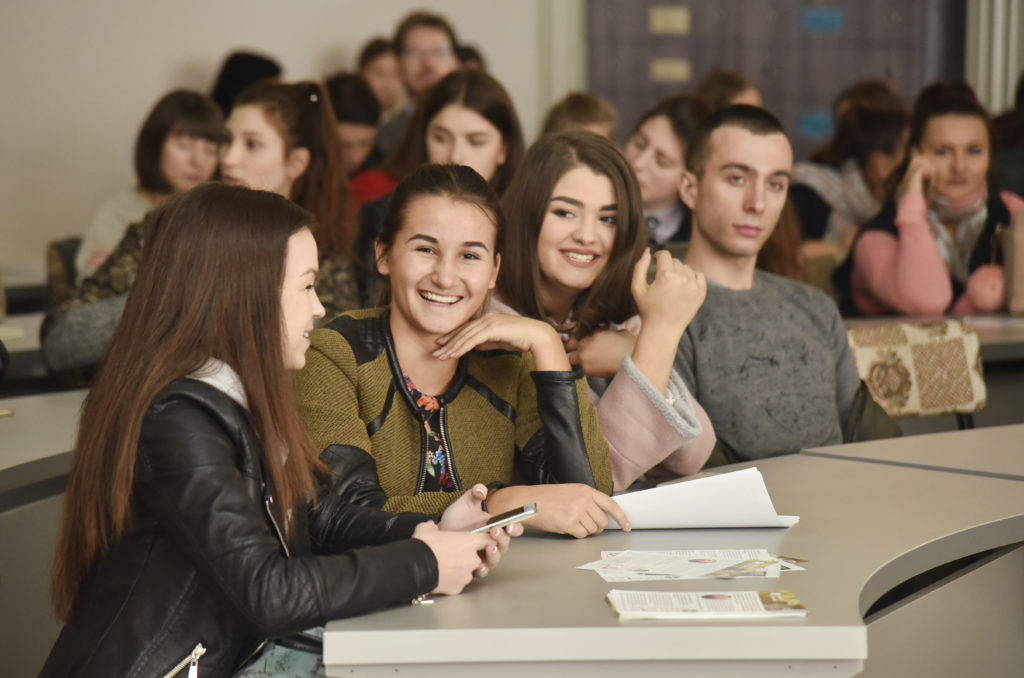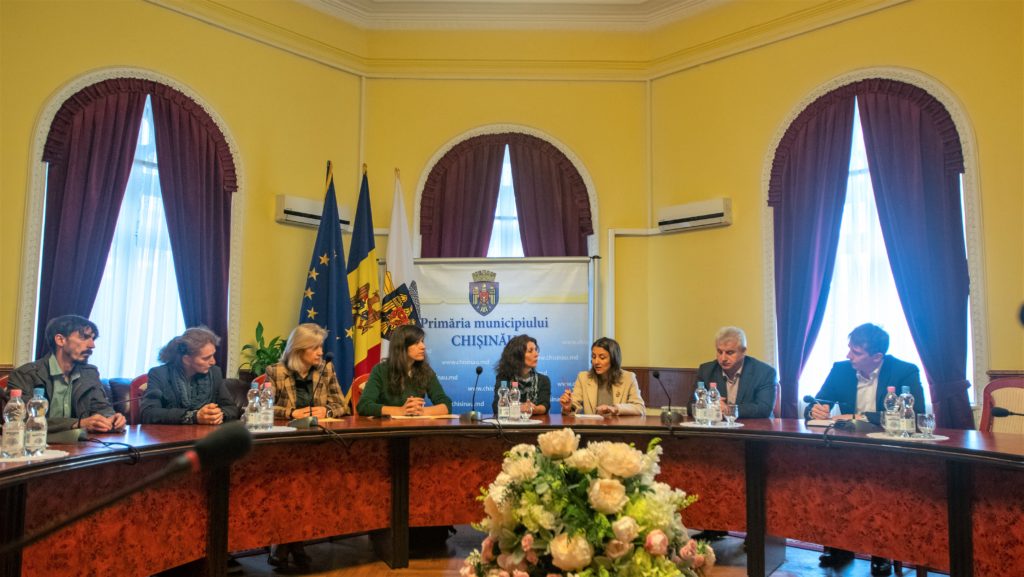După vizita lui Esther Ouwehand, membru al parlamentului neerlandez, administrația locală din Moldova promite apărătorilor drepturilor animalelor din zonă o politică mai bună cu privire la protecția animalelor
Last weekend – for the first time in Moldova’s history – a lecture was given on the importance of animal rights. Dutch MP for the Party for the Animals Esther Ouwehand held the lecture at a university in the capital Chișinău, in a packed lecture hall. After that, Ouwehand talked with local animal protectionists and experts in the field of organic arable farming. The council of Chișinău promised Ouwehand that a professional centre for sterilisation and vaccination of stray animals will soon be opened.

The lecture was held at the invitation of animal rights lawyer Ion Dron. During her lecture, Esther Ouwehand pictured how the efforts made for the welfare of animal also benefit people. She showed that society needs to be more connected with nature and that it should be led by compassion.
After the lecture, Ouwehand talked with several animal protectionists, who all pointed out the lack of regulations and legislation for the protection of animals in Moldova. Lawyer Dron wrote a legislative proposal in cooperation with a Moldovan NGO, which proposal is to legally enshrine the adequate protection of animals. Animal protectionists are now fighting together for adoption of this legislative proposal by the Moldovan Parliament.
Ouwehand was impressed by the many brave people in Moldova who dare to stand up for the interests of animals. And they do so quite successfully: animal protectionists’ protests helped to close down the dolphinarium of Chișinău . Also, a first step was taken against animal abuse by making cruelty against animals punishable in the Moldovan Penal Code.
Ouwehand: “Choosing the interests of the vulnerable instead of the right of the strongest can be done close to home too. The cruel treatment of (stray) animals is not acceptable in a civilised country. And we are so happy to see that here in Moldova brave people are standing up for the interests of animals and with that for the Moldovan people themselves. Wonderful!”

Agriculture
Ouwehand praised the fact that Moldova is doing relatively well within the region in the field of organic arable farming, where nutritious crops are grown, such as walnuts, fruit, beans and sunflower pits. However, she warned for the growing lobby of foreign companies to expand industrial livestock farming in Moldova. Now that the Western livestock industry is suffering a crisis and people in the West are less tolerant of the industry destroying their living environment, it sees opportunity to move its polluting practices to Eastern-Europe.
Ouwehand: “Moldova is well capable to provide food for the future: it has fertile soils and a great variety of crops, as a result of which a natural resistance against insects and plagues can be cultivated. Agriculture without overfertilisation and pesticides, with plenty of vegetable proteins for human consumption: that is what Europe needs. We hope that Moldova will not make the same mistake as the West did and will oppose to importing Western livestock practices, as this would mean a disaster for Moldova’s nature, animals, people and the environment.
Municipal policy

Moldovan animal protectionists told Ouwehand that local governments do very little to achieve animal welfare and that they even actively participate in the cruel approach of stray animals by facilitating so-called “Killing Stations”. That is why Ouwehand, together with animal protectionists, talked with the political advisor of the Mayor of Chișinău.
The council admitted that a lot can be improved in the area of animal welfare policy. The Mayor’s advisor then promised that the council will start to conduct an animal-friendly stray animals policy soon. The first step towards this is the opening of a professional centre for the sterilisation of stray dogs, where 50 dogs can be looked after and treated according to European standards. Ouwehand told the Mayor’s advisor that she will follow the progress through the local animal welfare organisations.
During the meeting with the council, animal rights lawyer Dron again emphasised why an appropriate animal welfare policy is essential: “Animal welfare is not only important for animals, but also for the entire society. An inadequate animal welfare policy will harm our society as a whole.”
Săptămâna trecută s-a ținut o prelegere cu privire la importanța drepturilor animalelor pentru prima dată în istoria Moldovei. Esther Ouwehand, deputat în Parlamentul neerlandez din partea Partidului pentru Animale, a ținut prelegerea la o universitate din Chișinău, într-o sală de conferințe plină ochi. Ulterior, Ouwehand a vorbit cu apărători ai animalelor locali și cu experți în domeniul agriculturii ecologice. Primăria municipiului Chișinău i-a promis lui Ouwehand că în curând se va deschide un centru profesional de sterilizare și vaccinare a animalelor fără stăpân.

Prelegerea a avut loc la invitația avocatului pentru drepturile animalelor Ion Dron. Esther Ouwehand a ilustrat în timpul prelegerii sale cum angajamentul față de bunăstarea animalelor este totodată un angajament față de oameni. Ea a arătat necesitatea unei societăți mai conectate cu natura și condusă de compasiune.
După prelegere, Ouwehand a vorbit cu diverși protectori ai animalelor, care au subliniat lipsa de legislație și reglementări care să protejeze animalele din Moldova. Avocatul Dron, în colaborare cu o organizație neguvernamentală din Moldova, au redactat un proiect de lege care trebuie să asigure prin lege o protecție adecvată a animalelor. Protectorii animalelor luptă acum împreună pentru ca acest proiect de lege să fie adoptat de Parlamentul Republicii Moldova.
Ouwehand a fost impresionată de mulțimea oamenilor curajoși din Moldova care îndrăznesc să apere interesele animalelor. Și ei reușesc acest lucru cu succes: datorită protestelor apărătorilor animalelor, delfinariul din Chișinău a fost închis. De asemenea, s-a făcut primul pas pentru combaterea cruzimii față de animale prin introducerea faptelor de cruzime față de animale în Codul penal.
Ouwehand: „Optând pentru interesele celor vulnerabili în locul drepturilor celor mai puternici se poate face și aproape de casă. Cruzimea în comportamentul cu animalele (inclusiv cele comunitare) nu aparține unei țări civilizate. Și suntem foarte bucuroși să vedem că aici, în Moldova, oameni curajoși se ridică apărând interesele animalelor și, astfel pe cele ale poporului moldovenesc. Minunat!”

Agricultură
Ouwehand a apreciat faptul că Moldova se descurcă relativ bine în regiune în domeniul agriculturii ecologice, unde se cultivă culturi nutritive precum nucile, fructele, fasolea și semințele de floarea-soarelui. Cu toate acestea, ea a avertizat cu privire la lobby-ul crescând al companiilor străine pentru a extinde creșterea industrială a animalelor în Moldova. Acum când industria zootehnică occidentală este în criză și oamenii din vest sunt din ce în ce mai puțin toleranți cu faptul că aceasta le distruge mediul ambiant, industria vede oportunități de a-și reloca practicile poluante în Europa de Est.
Ouwehand: „Moldova are tot ce este nevoie pentru alimente de viitor: soluri fertile și o mare varietate de culturi, care permit cultivarea unei rezistențe naturale la insecte și dăunători. O agricultură fără supra-fertilizare și pesticide, cu o cantitate mare de proteine vegetale pentru consumul uman: de aceasta are Europa nevoie. Sperăm că Moldova nu face aceleași greșeli ca și Occidentul și se va opune importului de practici industriale zootehnice din Vest, ceea ce ar fi un dezastru pentru natura, animalele, oamenii și mediul înconjurător moldovenesc.”
Politica municipală

Apărătorii animalelor moldoveni au declarat că administrațiile locale nu fac prea multe pentru bunăstarea animalelor și dimpotrivă, chiar participă activ la abordarea crudă a animalelor fără stăpân, printre altele, facilitând așa-numitele „Cuști ale morții”. De aceea, Ouwehand împreună cu protectorii animalelor au purtat discuții cu consilierul politic al primarului Chișinăului.
Municipalitatea recunoaște că mai sunt multe de îmbunătățit în domeniul politicii de bunăstare a animalelor. Apoi, consilierul primarului a promis că municipalitatea va introduce pe termen scurt o politică prietenoasă cu animalele comunitare. Primul pas înspre aceasta este deschiderea unui centru profesional de sterilizare a câinilor fără stăpân, în care 50 de câini pot fi adăpostiți și tratați conform standardelor europene. Primăria a promis, de asemenea, că autovehiculele în care sunt transportate animalele comunitare vor fi adecvate transportului pentru animale înainte de deschiderea centrului, echipându-le, printre altele, cu cuști bune și cu un sistem de ventilație. Ouwehand spune consilierului primarului că va urmări întregul proces prin intermediul organizațiilor locale de protecție a animalelor.
Avocatul pentru drepturile animalelor Dron a subliniat din nou în timpul întâlnirii cu municipalitatea motivul necesității unei politici adecvate privind bunăstarea animalelor: „Bunăstarea animalelor este importantă nu numai pentru animale, ci și pentru întreaga societate. Politica neadecvată privind bunăstarea animalelor dăunează societății noastre în ansamblu.”